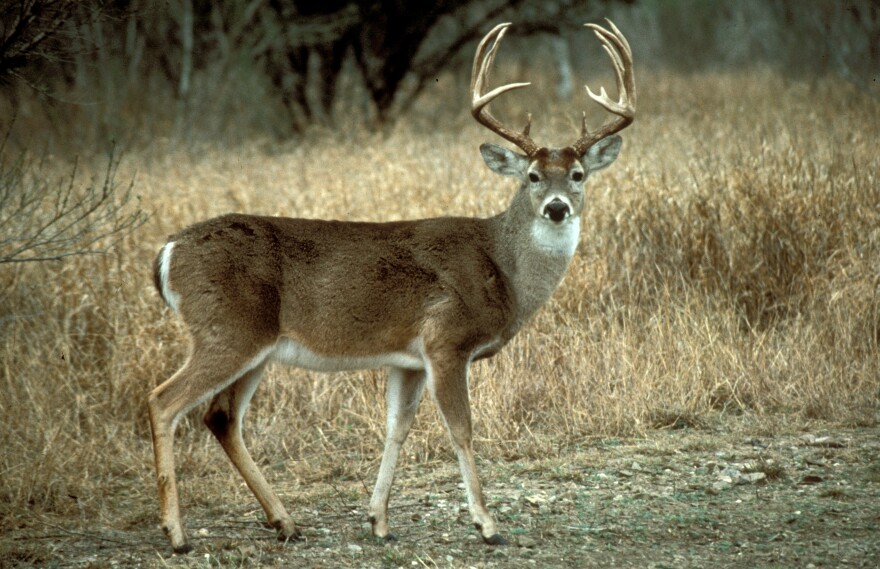The Texas Parks and Wildlife Department (TPWD) sent out a notice on Dec. 1, 2023 that it had euthanized a whole herd of white-tailed deer at the Kerr Wildlife Management Area in the Hill Country.
The Kerr WMA had hosted a herd of deer for research for nearly 50 years. But TPWD officials decided to depopulate the herd after a 14-month-old male deer tested positive for chronic wasting disease, or CWD.
CWD is a neurological disease that’s fatal for animals like deer, elk and moose. It’s also contagious, and has spread through Texas deer for more than a decade. TPWD staff didn’t know how it got into the facility, which is surrounded by several high fences.
It turns out, however, that the deer the department said tested positive for CWD may not have had the disease after all.
As part of their normal procedure, TPWD sent a tonsil sample from the deer to the National Veterinary Services Laboratories in Ames, Iowa. That lab has the final word on the presence of the disease. In this case, they did not confirm the positive result, which shocked a lot of people.
“To this point, all 600 and some samples that we’ve submitted … to the National Veterinary lab there in Iowa for confirmation had been confirmed. So it’s an extremely rare occurrence for us not to receive confirmation,” said John Silovsky, wildlife division director for TPWD.
» GET MORE NEWS FROM AROUND THE STATE: Sign up for Texas Standard’s weekly newsletters
Silovsky said an earlier confirmation test agreed the deer was infected. That was done by the Texas A&M Veterinary Medical Diagnostic Lab and a partner lab in Wisconsin.
“The opinion of Wisconsin and Texas labs were that the results were weak positive but convincing. And then when Iowa National Veterinary Science lab looked at it, they observed that staining was present, but they didn’t believe it to be truly positive,” he said.
These tests don’t necessarily give yes or no results. Sometimes it’s more like analyzing shades of grey.
The sample from the Kerr County deer showed some amount of the proteins that cause the disease. Whether that meant the deer had full blown chronic wasting disease came down to a difference of opinion between the labs.
What was clear though, is that the disease had not spread through the 70 or so other deer in the herd. The lab in Iowa analyzed samples from all the Kerr research deer, and none of them came back positive.
By the time TPWD officials knew this, the deer were already dead. They made the decision to euthanize the herd before getting confirmation from the national lab.
Silovsky said they did this because all the other tests of this kind they’d sent to Iowa had been confirmed. They also wanted to eliminate any possible spread from the Kerr facility, and to set a good example.
“Being that these were [in] our facility, and our intent to be a little bit more proactive in this process and hold ourselves to a higher standard than we may on a deer breeder, was part of the decision-making process,” he said.
Deer breeders who raise white-tails for trophy hunts are among those most affected by how the state manages CWD.
They’ve long been critical of the regulations — including in some instances, a requirement to euthanize their entire herd after a positive test.
The Texas Parks and Wildlife Commission met in Austin on Thursday, in part to discuss new rules for CWD. Several people took the opportunity to speak out about the deer in Kerr County.
“Texas Parks and Wildlife has employed one mission when faced with the possibility of CWD, no matter how low the risks might be. That is to kill, kill and kill,” said William Oehmig of Blue Creek Whitetails outside Falfurrias.
Wendy Schmidt told the commissioners that ending 50 years of research at the Kerr facility was “embarrassing.”
“Someone from Texas Parks and Wildlife jumped the gun and slaughtered the healthy white-tailed deer before confirmation of a negative test result was received. We Texans own those deer, and our tax money provided the millions of dollars supporting that facility,” she said.
Jody Phillips said she thought the commissioners were at least listening to their concerns and making headway. Phillips raises white-tails in East Texas, and is president of the Texas Deer Association, which represents deer breeders. How TPWD handled the positive result at the Kerr facility gave her pause about the state’s ability to manage the disease, however.
“That decision was made off of assumptions and not fact. And the people who made those decisions are the same people who are calling the shots for all the deer breeders in the state of Texas,” Phillips said.
Silovsky, the wildlife head for TPWD, stands by the decision to euthanize the Kerr white-tails. Environmental samples from the soil and feeding areas where the deer lived came back positive for the proteins that cause CWD. Those results haven’t been consistent, but he says they’ll keep testing.
If you found the reporting above valuable, please consider making a donation to support it here. Your gift helps pay for everything you find on texasstandard.org and KUT.org. Thanks for donating today.

